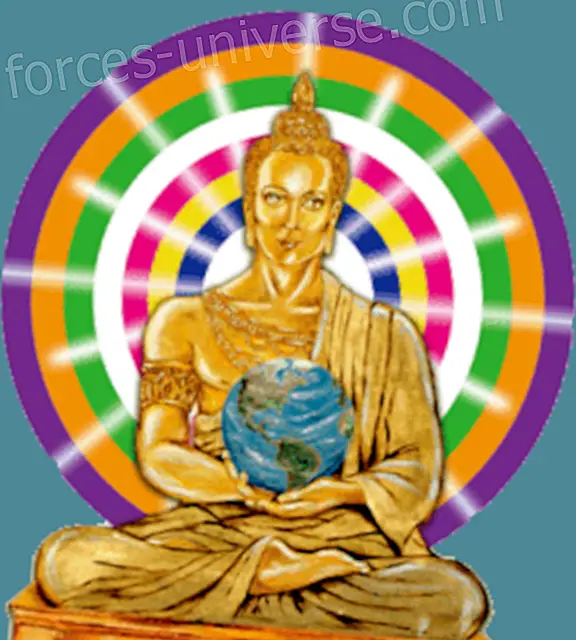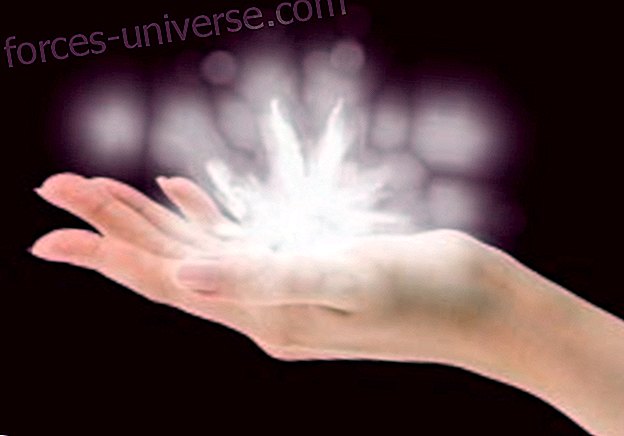
THE EGO: THE CURRENT STATE OF HUMANITY
Words, whether vocalized and converted into sound or silently formulated in thoughts, can have a practically hypnotic effect on the person. It is easy to get lost in them, to let ourselves be dragged by the implicit idea that the simple fact of having attributed a word to something is equivalent to knowing what that something is. The reality is that we don't know what that something is. We have only hidden the mystery behind a sign. Ultimately, everything escapes knowledge: a bird, a tree, even a simple stone, and without a doubt the human being. This is due to the immeasurable depth of all things. Everything we can perceive, experience or think is just the superficial layer of reality, less than the tip of an ice floe.
Under the surface not only everything is connected to each other, but also connected to the Source of life from which it came. Even a stone, although more easily a flower or a bird would, could show us the way back to God, to the Source, to our own being. When we observe or hold a flower or a bird and allow it to be without imposing a noun or mental label, a sense of wonder, of admiration, awakens within us. Its essence communicates quietly with us and allows us to see, as in a mirror, the reflection of our own essence. This is what great artists feel and manage to convey through their works. Van Gogh did not say: "That is just an old chair." He watched her again and again. He perceived the quality of the chair being. And then he sat down before the canvas and took the brush. The chair would have sold for a few dollars. The painting of that same chair would be sold today for more than $ 25, 000 million.
When we refrain from covering the world with words and labels, we recover that sense of how miraculous that humanity lost a long time ago, when instead of using thought, it submitted to it. The depth returns to our life. Things recover their freshness and novelty. And the greatest of miracles is the experience of our essential being prior to words, thoughts, mental labels and images. For this to happen we must free our Being, our feeling of Existing, from the suffocating embrace of all things with which it has been confused and identified. It is from this liberation process that this book is about.
The more attentive we are to attribute verbal labels to things, to people or to situations, the more superficial and inert reality becomes and the more dead we feel in the face of reality, to that miracle of life that unfolds continuously within us and around us That can be a way to acquire cunning, but at the expense of the wisdom that vanishes along with joy, love, creativity and vivacity. These are hidden in the quiet space between perception and interpretation. Of course, words and thoughts have their own beauty and we must use them, but do we need to be imprisoned in them?
Words seek to reduce reality to something that may be within the reach of the human mind, which is not much. The language consists of five basic sounds produced by the vocal cords. They are the vowels "a, e, i, o, u". The other sounds are the consonants produced by the air pressure: "s, f, g", and so on. Is it possible to believe that some combination of these basic sounds could one day explain what we are or the ultimate purpose of the universe, or the deep essence of a tree or a rock?
THE ILLUSION OF BEING
The word yo contains both the greatest error and the deepest truth, depending on the way it is used. In its conventional use, it is not only one of the most frequently used words in the language (along with other related ones such as: m o and mi ), but also One of the most deceptive. As we use it in everyday life, the word yo contains the primordial error, a wrong perception of who we are, a false sense of identity. That is the ego. That illusory sense of being is what Albert Einstein, with his profound perception not only of the reality of space and time but of human nature, called the optical illusion. of consciousness . That illusion of being then becomes the basis of all other interpretations or, better yet, wrong notions of reality, of all thought processes, interactions and relationships. . Reality becomes a reflection of the original illusion.
The good news is that when we recognize the illusion for what it is, it fades away. The illusion comes to an end when we recognize it. When we see what we are not, the reality of what we are emerges spontaneously. This is what will happen as you read this chapter and the next one slowly and carefully, which deal with the mechanics of the false self which we call ego. So, what is the nature of this false being?
When we talk about yo we generally do not mean who we are. By a monstrous act of reductionism, the infinite depth of who we are is confused with the sound emitted by the vocal cords or with the thought of the self that we have in our mind and whatever it is with which it is identified . So what do I, me and mine usually refer to?
When a baby learns that a sequence of sounds emitted by the vocal cords of his parents corresponds to his name, the child begins to associate the word, which becomes thought in his mind, with what he is. At that stage, some children refer to themselves in the third person. " Felipe is hungry." Shortly after they learn the magic word "I" and associate it directly with their name, which already corresponds in their mind to what they are. Then there are other thoughts that merge with that original "I" thought. The next step is the ideas of what is mine to designate those things that are part of the self in some way. This is how identification with objects happens, which implies attributing to things (and ultimately to the thoughts that represent those things) a sense of being, thus deriving an identity from them. When " my " toy is damaged or taken away, intense suffering suffocates me, not because the toy has some intrinsic value (the child soon loses interest in it and will then be replaced by other toys and objects) but by the idea of " mine " The toy became part of the sense of being, of the child's self.
The same thing happens as the child grows, the original "I" thought attracts other thoughts: identification with gender, belongings, body perception, nationality, race, religion, profession. The Self also identifies with other things such as functions (mother, father, husband, wife, etc.), acquired knowledge, opinions, likes and dislikes, and also with things that happened to "me" in the past., the memory of which are thoughts that contribute to further define my sense of being as "me and my story." These are just some of the things from which we derive our identity. In the end they are nothing but thoughts held precariously by the fact that everyone shares the same notion of being. This mental interpretation is what we usually mean when we say "I". To be more exact, most of the time it is not we who speak when we say and think "I", but some aspect of mental interpretation, of being egotistic. Once the awakening has occurred, we continue talking about "I", but with a notion emanating from a much deeper plane of our inner being.
Most people continue to identify with the incessant torrent of the mind, compulsive thinking, mainly repetitive and banal. There is no self apart from the thought processes and the emotions that accompany them. That is what it means to live in spiritual unconsciousness. When they are told that they have a voice in their head that never shuts up, they ask, "which voice?" Or they deny it angrily, obviously with that voice, from whom they think, from the unobserved mind. That voice could almost be considered as the entity that has taken possession of the people.
Some people never forget the first time they stopped identifying with their thoughts and briefly experienced the change, when they ceased to be the content of their mind to be the background consciousness. For other people it happens in such a subtle way that they hardly notice it, or hardly perceive a current of joy or inner peace, without understanding the reason.
THE VOICE OF THE MIND
In my case, that first flash of consciousness manifested itself as a freshman at the University of London. I used to take the subway twice a week to go to the university library, usually at about nine in the morning, ending the time of congestion. Once I sat in front of a woman in her thirties. He had seen her other times on the same train. It was impossible not to notice her. Although the train was full, nobody occupied the two seats next to her, no doubt because she looked insane. She looked extremely tense and spoke alone without stopping, in a strong and angry tone. She was so absorbed in her thoughts that, apparently, she didn't realize what was going on around her. His head was tilted down and slightly to the left, as if conversing with someone in the empty seat next to him. Although I don't remember the exact content of her monologue, it was something like this: “And then she told me… and I replied that she was a liar and how dare you accuse me… when it's you who has always taken advantage of me… I trusted you and you betrayed my trust… ” He had the angry tone of someone who has been offended and who needs to defend his position so as not to be annihilated.
When the train approached Tottenham Court Road Station, he stood up and headed for the door, still uttering the relentless torrent of words that came out of his mouth. As it was also my stop, I got off the train behind her. Already on the street she began to walk towards Bedford Square, still immersed in her imaginary dialogue, accusing and ragingly affirming her position. Full of curiosity, I followed her as she continued in the same direction I should go. Although she was absorbed in her imaginary dialogue, she apparently knew her destiny. We soon arrive at the imposing structure of Senate House, a building from the 1930s in which the administrative offices and the University library were housed. I felt a shiver. Was it possible that we were going to the same place? Exactly, it was going there. Was she a teacher, student, office worker, librarian? I was about twenty steps away so that when I passed the building door (which was, ironically, the headquarters of the "Police of the Mind" in the 1984 film version, George Orwell's novel), it had disappeared Inside one of the elevators.
I felt bewildered by what came to witness. At 25, I felt that I was a mature student in the process of becoming an intellectual and was convinced that I could elucidate all the dilemmas of human existence through the intellect, that is, through s of thought. I had not realized that thinking unconsciously is the main dilemma of human existence. I thought that the professors were wise holders of all the answers and that the University was the temple of knowledge. How could a madman like her be part of that? I kept thinking about her when I entered the bathroom before heading to the library. While washing my hands, he thought, I hope not to end up like her. The man next to me looked at me for a moment and startled me when I realized that I had not thought the words but had spoken them out loud. For God's sake, I'm already like her, he thought. Wasn't my mind as active as hers? The differences between the two were minimal. The predominant emotion was anger, while in my case it was mainly anxiety. She thought out loud. I thought, mainly, inside my head. If she was crazy, then we were all crazy, including myself. The differences were only a matter of degree.
For a moment I could distance myself from my mind and see it, as it says, from a deeper perspective. There was a brief step from thought to consciousness. I continued in the bathroom, alone, and looked at myself in the mirror. At that moment when I could separate myself from my mind, I let out the laughter. It may have sounded like the laughter of a madman, but it was the laughter of sanity, the laughter of the Buddha of the big belly. Life is not as serious as the mind pretends to make me believe, it seemed to be the message of laughter. But it was only a flash that will be quickly forgotten. I would spend the next three years of my life in a state of distress and depression, fully identified with my mind. I had to go almost to suicide to return consciousness and, on that occasion, it was not just a flash. It freed me from compulsive thinking and the false self devised by the mind.
The incident that I have just narrated was not only my first flash of conscience, but also sowed in me the doubt about the absolute validity of the human intellect. A few months later a tragedy happened that raised my doubts. One Monday we arrived early in the morning to attend the conference of a teacher I admired deeply, only to find out that he had committed suicide during the weekend. I was stunned. He was a very respected teacher, who seemed to have all the answers. However, I still did not know of any alternative other than cultivating thought. I still didn't realize that thinking is only a tiny aspect of consciousness and I also didn't know anything about the ego and even less about the possibility of detecting it inside me.
CONTENT AND STRUCTURE OF THE EGO
The egotistic mind is completely conditioned by the past. Its conditioning is double and consists of content and structure.
For the child who cries bitterly because he no longer has his toy, it represents the content. It is interchangeable with any other content, other toy or object. The content with which we identify ourselves is conditioned by the environment, the upbringing and the culture that surrounds us. The fact that he is a rich child or
poor, or that the toy is a piece of wood in the form of an animal or a sophisticated electronic device does not matter in regard to the suffering caused by its loss. The reason why this acute suffering occurs is hidden in the word "mine" and is structural. The unconscious compulsion to promote our identity through association with an object is an integral part of the very structure of the egotistic mind.
One of the basic mental structures through which the ego comes into existence is identification. The word "identification" comes from the Latin "idem" which means "equal" and "facere" which means "to do." Thus, when we identify with something, we " do the same " . Same as what? Same as me. We give that something of
a sense of being, in such a way that it becomes part of our "identity." At one of the most basic levels of identification are things: the toy then becomes the car, the house, the clothes, and so on. We try to find ourselves in things but we never succeed at all and end up losing ourselves in them. That is the destiny of the ego.
THE IDENTIFICATION WITH THINGS
Those who work in the advertising industry know very well that to sell things that people do not really need they must convince them that those things will contribute something to the way they see themselves or how others perceive them, in other words, that They will add to your sense of being. They do it, for example, stating that we can stand out from the crowd using the product in question and, therefore, that we will be more complete. Or they create the mental association between the product and a famous character or a young, attractive or seemingly happy person. Even photographs of elderly or deceased celebrities when they were at the top of their careers fulfill that purpose well. The unspoken assumption is that when we buy the product we arrive, thanks to a magical act of appropriation, to be like them or, rather, as their superficial image. Therefore, in many cases we do not buy a product but a “reinforcement for our identity”. Designer labels are primarily collective identities to which we affiliate. They are expensive and, therefore, "exclusive." If they were available to everyone, they would lose their psychological value and we would only keep their material value, which surely amounts to a fraction of the price paid.
The things we identify with vary from one person to another according to age, gender, income, social class, fashion, culture, and so on. What we identify with is related to the content; on the other hand, the unconscious compulsion to identify is structural. This is one of the most elementary ways in which the egotistic mind operates.
Paradoxically, what sustains the so-called consumer society is the fact that the attempt to recognize ourselves in things does not work: ego satisfaction lasts little and then we continue with the search and continue shopping and consuming.
Of course, in this physical dimension in which our superficial being dwells, things are necessary and are an inevitable part of life. We need housing, clothes, furniture, tools, transportation. Perhaps there are also things we value for their beauty or their inherent qualities. We must honor the world of things instead of despising it. Each thing has a quality of Being, it is a temporary form originated within the One Life report source of all things, all bodies and all forms. In most ancient cultures it was believed that all things, even inanimate objects, housed a spirit and, in this sense, were closer to the truth than us. When one lives in a world lethargic by mental abstraction, the life of the universe is not perceived. Most people do not live in a living reality but conceptualized.
But we cannot really honor things if we use them to strengthen our being, that is, if we try to find ourselves through them. That is exactly what the ego does. The identification of the ego with things gives rise to attachment and obsession, which in turn create the consumer society and economic structures where the only measure of progress is to always have more. The uncontrolled desire to have more, to grow incessantly, is a dysfunction and a disease. It is the same dysfunction manifested by cancer cells whose sole purpose is to multiply without realizing that they are causing their own destruction by destroying the organism of which they are part. Some economists are so attached to the notion of growth that they cannot release the word and then speak of "negative growth" to refer to the recession.
Many people exhaust a good part of their lives in obsessive concern about things. That is why one of the evils of our times is the proliferation of objects. When we lose the ability to feel that life we are, we will most likely try to fill life with things. As a spiritual practice, I suggest you investigate your relationship with the world of things by observing yourself and, in particular, by observing things designated with the word mi . You should stay alert and see honestly if your sense of worth is tied to your possessions. Are there things that induce a subtle sense of importance or superiority? Does the lack of these things make you feel inferior to other people who have more than you? Does he casually mention the things he owns or flaunts them to appear superior to the eyes of another person and, through him, to his own eyes? Do you feel anger or resentment when someone has more than you or when you lose a precious asset?






